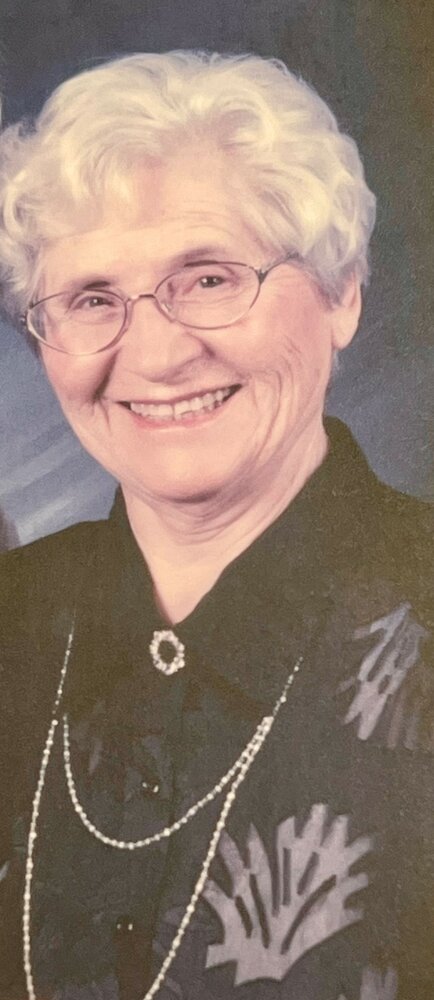Family Owned & operated since 1941
Vineland Phone #:
(905) 562-5454

Obituary of Jutta Wegener
Jutta Wegener (nee Teske), born September 4, 1928 in Tiege Ukraine, passed peacefully on Monday, June 26, 2023 at Tabor Manor in St. Catharines. Jutta who had been married to her devoted husband Juergen for 75 years is survived by children, John (Dawn), Peter (Hildie), Marlene (Bob) Riediger and predeceased son Fred, 13 grandchildren, 26 great-grandchildren and 4 great-great grandchildren.
She was a God-fearing woman who walked humbly with her God. She was a loving wife, a caring mother, grandmother and great grandmother. She led an exemplary life of compassion, selflessness, and dedication to her loved ones. She was a blessing of joy and encouragement to her family and friends. She was a pillar of strength and a guiding light in encouraging her family to love and support one another and to live a life and raise their family with her Lord and Saviour, Jesus Christ at the center.
The family would like to extend their thanks and appreciation to the 4th floor staff at Tabor Manor who looked after our mom and made her final year as comfortable as possible.
A funeral service will take place on June 29th at the St. Catharines United Mennonite Church, 335 Linwell Road, St. Catharines. The visitation will be at the church and commence at 9:30am, followed by a service at 11:00 am, followed by a light lunch.
Flowers may be sent to the church directly. In lieu of flowers, please consider a donation to the Mennonite Central Committee (MCC).
Jutta Wegener (nee Teske) Eulogy
Jutta Wegener was born on September 4,1928 in Tiege, Ukraine, a small village 110 Km Northeast of Cherson. She was the second of four children born to Peter Teske and Helen Janzen. Her early childhood in this rural Mennonite setting was quiet and uneventful, enjoying life with her siblings Helen, her older sister; Peter, her younger brother and her baby sister Katie, as well as her cousins, aunts and uncles who all lived close by. Her days were filled picking fruit, tending the cow and helping her mother with daily chores. By 1936, her father Peter, who came from a medical/administrative family, had become director of a mill in the town of Kronau. As the mill was some distance away, the family would see their dad on weekends only. But all in all, life for the Teske’s was good.
Unfortunately, the tide was turning. On the morning of December 4, 1937, as Jutta’s father was about to return home for the weekend, he was arrested by the Communist party and taken in for questioning. Only recently has the family learned that he was shot by the secret police on January 22, 1938, after being charged with anti-government activities. At the time of his arrest and disappearance Jutta was 9 years old and her mother, who was now alone supporting the family, was 33 years old. Times were tough and the family pulled together to make ends meet by rationing food and taking in boarders.
After the invasion of Poland and the expansion of the German war effort, the German army finally arrived in Tiege in 1941. For ethnic Germans, the presence of the German army was a great benefit. It meant an end to constant threats, surveillance and internments by the Russian police and a return to normal life. This tranquility did however, not last long and once again life for the Teske’s was disrupted. With the forced retreat of the German army in October 1943, all ethnic Germans were ordered to load a horse drawn covered wagon with their possessions for a long trek back to Germany. At this point Jutta was just 15 years old. It was a rainy fall and soon the wagons were bogged down in the mud. While the men forged the wagons on toward Germany, the women and children were housed in local villages from mid-November till February, then transported by train to Poland, now annexed by Germany. Here the refugees were fed, bathed, given clean cloths and assigned to polish homes and work groups. As a result, in September 1944, Jutta was sent to a trade school to become a pastry chef. Again, however, the plan was thwarted. As the Russian counteroffensive reached Poland, Jutta and her cousin, fearing for their safety, boarded a train bound for Germany. She had lost track of her mother and siblings but after reaching Germany and with the help of the Red Cross the family was reunited and finally settled on a large estate farm in West Germany on the Elbe River. This was the life she remembered and left behind in the Ukraine. The war ended on May 7th, 1945.
In July 1945, after his release from an English internment camp in West Germany, Juergen and a friend, dressed in their naval uniforms, an unusual sight in a farming community, came upon the Teske family and, of course Jutta. It wasn’t long after they met that Juergen and Jutta were married. The custom then was to have the wedding at the husband’s village. Juergen’s village, however, was in the Russian zone, so Jutta, her mother and sister had to sneak across the border with the groom. They had a small wedding at the village church and then returned to the English zone.
It was a difficult time for Mennonite refugees in Germany. If you said you were Russian, you would likely be shipped to Siberia. If you said you were German, you would not be allowed to emigrate. This was a real problem because times were tough in post war Germany. Furthermore, most Mennonite refugees knew little about God or the Mennonite traditions. This was because it was dangerous to talk about these things under Stalin’s regime. Nonetheless, with the help of the MCC (Mennonite Central Committee) many families were able to leave Germany and in April 1950 Jutta’s mother and siblings were finally able to emigrate to Canada.
In the meanwhile, Jutta bore two children, Hans Jurgen and Siegfried, both born in Germany in 1947 and 1948. While Jutta was pregnant with Siegfried, Hans Jurgen became very ill. The doctor told them that the baby had leukemia and wouldn’t live much longer. Although Jutta was not a Christian and had no religious background, she began to pray earnestly to God for the life of her child and for the acceptance of Jesus as her savior. In a short time, the doctors discovered that Hans Jurgen was completely healed. As a result of this event Jutta became and has continued to be, a devote Christian. Jutta and her family were finally given permission to join her mother and siblings in Canada in December 1950.
On arriving in Canada Jutta reunited with her mother and siblings and all stayed in a house in Grimsby, Ontario. Juergen and the rest of the family worked hard to make ends meet while Jutta stayed at home cooking and washing for all. After Juergen obtained a job with McKinnons in St. Catharines in 1952, Jutta, Jurgen and the two boys moved to St. Catharines. Within the next two years ; Peter in 1954 and Marlene in 1956 were born. Never having lost the lust for rural family life, Jutta convinced Juergen to purchase a small farm with an old farmhouse in Beamsville and to attend the Vineland United Mennonite Church in Vineland. With an ongoing interest in spiritual rebirth Jutta approached Elder Wichert, a prominent member of the U.M. Church to guide her. To that end, both Jutta and Juergen were baptized in June 1969 at Vineland U.M. Church. She became very active in the church, becoming a Sunday school teacher and later president of the church’s women’s group. As music was important to both Jutta and Juergen and as they saw music as a means to reinforce family and community ties all members of the family were encouraged to learn to play an instrument and sing for others. Juergen and Jutta themselves frequently sang and played at church and seniors’ homes and at many community events.
Since then, life for the Wegener family flourished with new homes being built, the purchase of a cottage for the family, marriage celebrations and so on. With few exceptions, Saturday and Sundays found Jutta’s kitchen filled with family and friends playing music, baking zwieback, discussing issues of the day, new business ventures and no doubt Oma telling stories of days gone by to the grandchildren. It was a time to celebrate the hard work and risks that had been endured by Jutta and Juergen to achieve this success.
At the time of her death Jutta had been married to Juergen for 75 years; with progeny consisting of four children, 13 grandchildren, 26 great grandchildren and 4 great great grandchildren.
Looking back over Jutta’s life one can see how events took shape according to God’s purpose for them. Jutta always thought that before her father was killed, he had prayed for the safety and care of his family. Becoming a committed Christian helped her to understand many things in the past which seemed coincidental at the time. In comparing her life now with the life she led in the Ukraine, and which she and Juergen led in Germany at the war’s end, one can marvel at how God has done wonderful things for them personally and the Wegener family.
In summary then, our mother was a God-fearing women who walked humbly with her God. She was a loving wife, a caring mother, grandmother and great grandmother. She led an exemplary life of compassion, selflessness, and dedication to her loved ones. She was a blessing of joy and encouragement to her family and friends. She was a pillar of strength and a guiding light in encouraging her family to love and support one another and to live a life and raise their family with her Lord and Saviour, Jesus Christ at the centre.
We were blessed with a good mother, and her voice will always keep us here, feet on the ground, heart in hand, and always facing forward.
Mom, you’ll be in our hearts forever.

